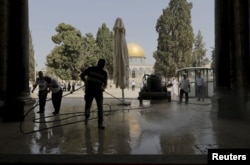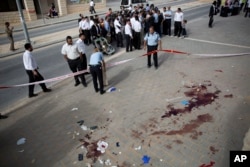Israel has for the first time in weeks lifted age restrictions on Muslim worshippers at a sensitive East Jerusalem holy site, in a move possibly aimed at reducing tensions that have resulted in a deadly wave of unrest.
The restrictions, which had been in place on Fridays since clashes erupted in mid-September, barred younger Muslim men from entering the Al-Aqsa mosque compound, which is known to Muslims as the Noble Sanctuary.
The site is also revered by Jews, who call it the Temple Mount. It has been a focus of weeks of protests by Palestinians, who fear Israel wants to change the internationally established rules governing the facility.
Under the long established rules, Israel is responsible for security at and governs access to the compound, while Jordanian-run Islamic society maintains administrative control of the holy site.
Israel denies wanting to change the status quo at the mosque compound. On Friday, an Israeli police spokesman said the decision to lift the age restrictions follows a security assessment.
Kerry optimistic after meetings
The move comes after U.S. Secretary of State John Kerry on Thursday voiced a "cautious measure of optimism" that a solution can be found to defuse deadly Israeli-Palestinian violence.
Following a four-hour meeting Thursday with Israeli Prime Minister Benjamin Netanyahu in Berlin, Kerry said some proposals could be proposed in the coming days that could have an impact on stopping the unrest.
He said he plans to discuss the proposals with Palestinian President Mahmoud Abbas and Jordanian King Abdullah during a meeting Saturday in Jordan's capital, Amman.
Kerry also said it is time for the Israelis and Palestinians to move beyond "condemnations and rhetoric," and he urged both sides to take concrete steps to stop the violence, which has left at least eight Israelis and about 50 Palestinians dead.
Netanyahu reiterated his charge the violence is a direct result of Palestinian incitement, blaming Hamas, the Islamist movement in Israel, and Abbas.
Latest violence
Israel's military on Friday said Israeli troops shot a Palestinian after he stabbed a soldier near the Jewish settlement of Gush Etzion south of Jerusalem.
On Thursday, Israeli news reports said two Palestinians stabbed a Jewish man in Beit Shemesh after initially trying to board a school bus.
The violence has stemmed mostly from Palestinians using knives, guns and vehicles to attack Israeli civilians and soldiers, followed by Israeli defense mechanisms and retaliation. Many Palestinians have also been killed in violent clashes and protests with Israeli security forces.
Ban 'not optimistic'
On Wednesday, U.N. Secretary-General Ban Ki-moon said he was "not optimistic" after his talks with the Israeli and Palestinian leaders. He urged both sides to pull back from the brink of what he says could erupt into a full-blown Palestinian uprising.
"We will continue to support all efforts to create the conditions to make meaningful negotiations possible," Ban said after meeting with Abbas in the West Bank town of Ramallah.
"Our most urgent challenge is to stop the current wave of violence and avoid any further loss of life," he added.
Netanyahu has said Abbas and the Palestinian leadership must stop “lying” about Israel, specifically, rumors that Israel is planning to take over the East Jerusalem holy site revered by both Jews and Muslims.
Abbas this week blamed the violence on Israel's "continued occupation and aggression against Christian and Muslim holy sites in East Jerusalem."
The violence appears to also stem from young Palestinians tired of the dim outlook for peace, little economic opportunity and Israeli settlements in lands they want for a future state.







